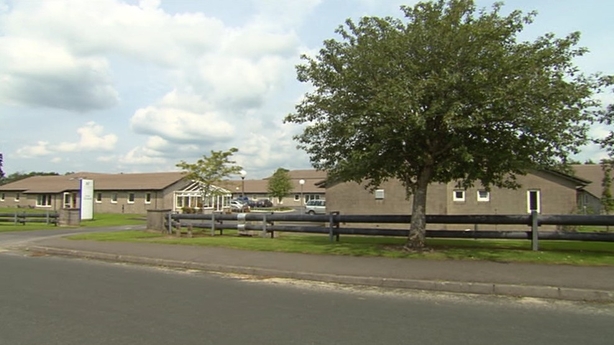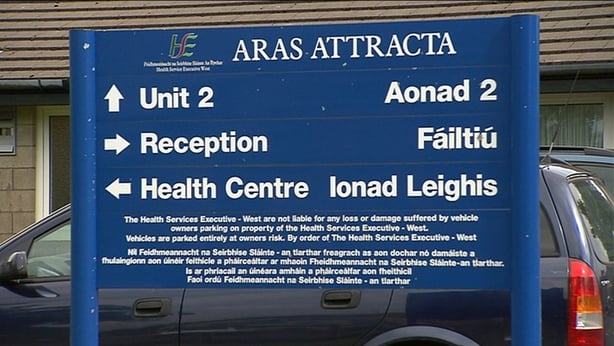The independent review of the Áras Attracta care home has said there was widespread control of its mostly elderly residents, which was generally imposed for the ease of managing the service and the convenience of management and staff.
The report of the Áras Attracta Swinford Review Group was commissioned by the Health Service Executive to review the quality of care provided at the complex in Swinford, Co Mayo.
It followed RTÉ's screening in December 2014 of an undercover investigation of conditions inside Bungalow Three on the Aras campus.
The review has recommended that residents who are ready now to move to non-institutional settings must be supported to do so without delay.
The HSE's response, which is contained in the report, states that 27 residents will begin moving to community settings this year with a further 26 next year.
The HSE said it will engage with the remaining 37 residents and their families about choices and options for the future.
It said its vision for the facility is to move it from being an institutional model of care to a community-based, person-centred one.
Voices of residents not heard - McCoy
The review group has recommended a move to a rights-based social model of service delivery.
It said the current model of service delivery at Áras Attracta is one that promotes dependence over independence.
It said it fails to respect the dignity and rights of individuals.
The report found that a rights-based social model of service delivery would positively affirm the rights of those with a disability.
The report recommends a strengthening and enhancing of leadership and management at Áras Attracta.
It said the patterns of support for residents in Áras Attracta have not kept up with national and international developments.
It found the service has become "isolated and marginalised".
The group found that this resulted in a situation where there is no clear vision for the service and residents' futures.
It recommends that a leadership development programme be implemented and a communications strategy is developed for all key stakeholders.
The report said the voices of residents need to be facilitated, listened to, and promoted.
It said that some people with an intellectual disability have considerable communications difficulties and cannot speak for themselves.
Others, it said, become accustomed or resigned to a pattern of life and cannot envisage an alternative.
While others, the report found, have become institutionalised and are not equipped to make even simple decisions about their lives.
In certain circumstances the review group found that there is a requirement to infer their needs from observation, from conversation with their family members, and from the opinion of key workers and other staff in relation to their will and preference.
It has recommended a number of initiatives that might make it easier to listen to residents and to act upon their will and preferences.
They include promotion and extension of the residents' forums that have emerged in some bungalows; greater attention to the expressed and inferred preferences of individual residents and extension of the role of the key worker to include a remit to actively give effect to residents' preferences.
It has also recommended the appointment of a community liaison officer to identify organisations, groups, sports clubs or individuals in the community with whom particular residents might share mutual interests, skills or activities.

The four-member Review Group's report runs to over 200 pages.
In a chapter titled "Áras Attracta: a bleak picture" it is noted "there was widespread institutional conditioning and control of residents in the facility resulting in limitations in their rights, choices and freedom".
Overcrowding and lack of privacy were significant issues. Some residents had their own bedrooms, while there were as many as four sharing others.

Creating a homely feeling in these circumstances is difficult to achieve, the report said. Some residents had personal items (photos, furnishings, and so on) in their rooms, but others were living in dull or bleak surroundings with their beds separated by dividers and curtains.
The report said Áras Attracta has few links with the local community and community organisations and there were many examples of missed opportunities in this respect - one resident was observed knitting in the day services centre while there is a thriving knitting club in the town.
Mass is celebrated every week in Áras Attracta, but few residents attended the local church. There is a GAA pitch across from the main entrance to the campus yet residents who follow GAA do not attend matches, the report said.
Another chapter in the report said its findings reflect failures at all levels in the system and change to date at Áras Attracta has been driven mainly by compliance issues.
It said the recommendations and actions outlined in the report, however, "require deep transformational change and capacity for change needs to be strengthened and the pace of change accelerated so that residents who are ready to move now to a non-institutional setting in the community are supported to do so without delay".
The report's authors also say in the course of their work they were encouraged to observe much patient, kind and sensitive support being shown by staff to residents, and "it was clear that there are strong bonds of affection and dedication between staff and many residents".

